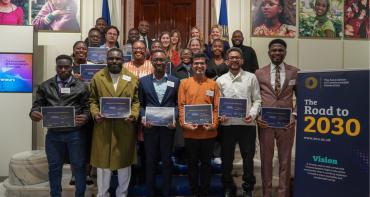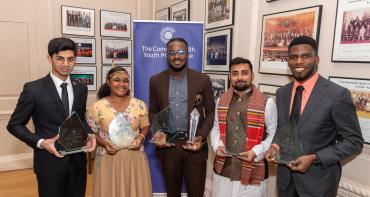Estimates show only 2 billion of the world’s 7.8 billion people speak these languages, either as a native or non-native language.

A blog by Aurelia Bruce, Commonwealth Social Policy Division
Imagine not having access to critical information, simply because you cannot speak English, Spanish or French - the commonly spoken languages of international organisations.
Estimates show only 2 billion of the world’s 7.8 billion people speak these languages, either as a native or non-native language.
On 9 December 2015, the UN Security Council passed the critically important Resolution 2250 - described by the UN-Habitat as “a paradigm shift” away from perceiving young people as a security threat and towards seeing them as leaders in “transforming violent conflict to peaceful co-existence”.
However, because it was written in English, Spanish and French, 5.8 billion people were unable to read or understand its content.
This landmark resolution can enable communities and grassroots organisations to leverage the vibrancy and talent of young people in peace and security efforts. But many were unable to access its policy measures and implications, and relay them to beneficiaries. This gap in integrating resources into areas most affected by violence and conflicts, simply because of a language barrier, concerns Commonwealth stakeholders.
In fact, in 2018, when Commonwealth coordinators went into violence-prone regions to provide training on Resolution 2250, they were met with cynicism. This scepticism about the practical application of the resolution to their territory was perhaps a result of a lack of context and explanation of the initiative in a language that participants could understand.
The issue was raised when the Commonwealth Secretariat, in partnership with the United Nations Department for Economic and Social Affairs, began the ‘Promoting Sustainable Peace through National Youth Policies’ project in 2019. At a workshop, hosted by the Commonwealth Youth Peace Ambassadors Network (CYPAN), as part of the project, young people decided to take action.
Speaking international law in local tongue
They resolved to translate the key pillars of Resolution 2250 to Kiswahili – given that much of their work focused on the Great Lakes Region (Eastern and South-Eastern Africa) where this is the official language. The impact was going to be significant as approximately 16 million people speak Kiswahili as a native language and about 82 million people speak it as a second language.
The hope is this translation, which has since been validated by the UN, will assist communities in Kenya, Uganda, Mozambique, Rwanda, Zambia, and Malawi as well as those in non-Commonwealth territories such as Burundi, Democratic Republic of Congo, Tanzania, Somalia, and Comoros Island to be involved in the Commonwealth’s peace-building efforts; and to develop and implement peace-keeping activities based on the principles of Resolution 2250.
The initiative is a great example of how the Commonwealth’s core principles of inclusivity and access to information are inspiring its young people and driving its work. It demonstrates how the powerful partnership of Commonwealth affiliates can bring about much needed change and ensure that marginalised groups are actively involved in development efforts.
It also highlights the importance of CYPAN, which is made up of young people from across the Commonwealth, that the Secretariat engages and invests in to promote peace-building in their countries and regions. The Commonwealth relies on the expertise of this network to inform its work programme, interventions and training for young people.
To find out more about the work that we undertake with young peace-builders or how you could support their efforts and similar projects, email [email protected].



